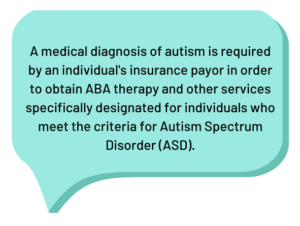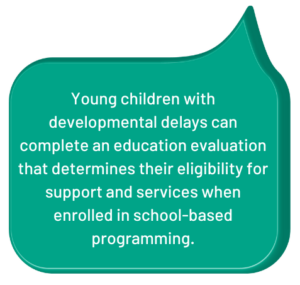Evaluation for Autism or Educational Evaluation?
Clinically reviewed by: Sarah Leone, Ph.D., Licensed Psychologist
Introduction
For parents who have concerns about their child’s development, terms such as evaluation, diagnosis, educational assessment, and IEP can all be overwhelming. So then, what exactly do these terms mean for parents, and does my child need all of these things?
First, let’s talk about Autism Spectrum Disorder (ASD) screens and evaluation. As we know, ASD can reliably be diagnosed when a child is still a toddler (ranging between ages 16 – 24 months old). But what leads to this and what else may be needed?
If you start to notice that your child may have some developmental delays or you think your child could be showing signs of autism, it is imperative that you request an autism screening from your child’s pediatrician in order to know what to do next.
- After conducting a screening measure with you and your child, the pediatrician may refer you to schedule a diagnostic evaluation for autism.
- The pediatrician may also recommend parents arrange an educational evaluation to determine if a child or their family is eligible for early developmental support and services.
- It’s strongly recommended that when there is a confirmed suspicion of autism signs in early children, parents and pediatricians discuss the need for both types of evaluations. (More about this later on.)


Autism Evaluation for Toddlers and Young Children
Pediatric Office Screening:
An autism screening (such as the M-CHAT-R) is completed like other tools or questionnaires that focus on milestones and age-appropriate behaviors. Sometimes this is done via a casual conversation at a well-check (at 18 or 24 months, for instance), but either way, a pediatrician should conduct this and be willing to point out or discuss any developmental concerns during this interaction.
This interaction is not an official diagnosis for autism. Instead, a measure like the M-CHAT-R is used to help determine the child’s risk level of potentially having autism. Scoring the measure tells the pediatrician if the family should be referred for a formal medical diagnostic evaluation for autism and/or for a formal assessment for early intervention services.
What happens if I am referred to an Autism diagnostic evaluation?
When referring to an actual medical diagnosis for autism, it is usually provided by a trained specialist such as a developmental pediatrician, child psychologist, neurologist, or a multi-disciplinary team with other specialists. This is a formal evaluation to take a comprehensive look at a child’s behavior patterns and skills. The evaluator(s) will use a variety of standardized measures in conjunction with observing the child in specific environments and interviewing the parent(s)or caregivers. All of this is used to create a well-formulated clinical “picture” to determine whether or not they meet the criteria for a medical diagnosis of Autism Spectrum Disorder (or F84.0). Every specialist has their own style of evaluating a child for autism and it’s perfectly fine to ask questions about how the process will flow when the appointment is made.
If a child is officially (or “medically”) diagnosed with Autism Spectrum Disorder, this can often open the door to qualify for services such as ABA Therapy, Speech Therapy, and Occupational Therapy. Most insurance plans include these in their benefit offering as medically necessary treatments.
ABA Therapy, or Applied Behavior Analysis, is a specialized treatment modality to help young learners with autism spectrum disorders or other developmental needs to more easily learn and use new skills. ABA can be up to 40 hours weekly, and often takes the place of preschool for a young child diagnosed with autism so that they are as prepared as they can be to start kindergarten. Children are paired with a trained therapist to develop skills related to socializing, communicating, self-help, and getting ready for school. While this therapy can be done at home, research shows that children have the best chance of making progress when they are at a center where peer interaction can be maximized.
Why would my toddler or preschooler need an Educational Evaluation?
So now that you have a basic understanding of a medical diagnostic evaluation process for ASD, what is an educational evaluation? An educational evaluation is a very important step that is done for different (but somewhat overlapping) reasons. Infants or preschoolers with developmental or other pre-academic delays often need early intervention help, due perhaps to general developmental delay, genetic conditions, neurological or movement disorders, or even autism. To receive formal early intervention benefits, these suspected delay areas must be established through a county or regional educational evaluation. These early learners can then benefit from early help, and this help can follow them into preschool, kindergarten, and later classroom settings. So getting assessed by professionals knowledgeable about early development, early speech, early cognitive skills, etc, is a wonderful opportunity to learn more about a child’s skills that need some boosting vs. skills that are on track for their age level.
For infants up to the age of 36 months, those who qualify will receive an IFSP or Individualized Family Service Plan. An IFSP helps the child build core skills in their home and community. For children ages 3 and up, those who qualify are issued an IEP or Individualized Education Plan. An IEP is a more educational or pre-academic set of supports to build skills in anticipation of preschool and kindergarten. The appropriate learning environment is often outlined in the IEP and helps to determine how to help the child to be as successful as possible.
So even if your child is very young (toddler age) and has not been in a classroom yet, an educational evaluation is still important, as this can be the start of documenting your child’s aptitude in various areas. Education-based evaluations will be an ongoing process (throughout your child’s school years). It will help teachers highlight where your child may need additional assistance and what measures could be taken in order for your child to be successful in school and beyond. All of this information will go into your child’s IEP, which follows them as they progress through school, even if you change schools.
Remember, a medical diagnosis of autism can open doors for behavioral and medically-necessary services like ABA, Speech, and Occupational therapies. Such a diagnosis does not magically issue an IEP or IFSP.
However, any treatment that a toddler or preschooler has received for their autism, including recent clinical observations from a specialty provider such as a Board Certified Behavior Analyst (BCBA), speech therapist, or occupational therapist, should be shared with the individuals helping to evaluate the child for their IEP. The IEP process in this case is an opportunity to advocate for your child to receive any similar necessary services in the school setting. An IEP is individualized, and by its nature, is unique to the individual and their needs.
So how do I arrange an early educational assessment that could provide an IFSP or IEP for my child?
Every state, including both Maryland and Virginia, has early intervention (EI) services and supports to provide various types of assistance to infants, toddlers (before the age of 3), and their families. Early intervention may include speech therapy, physical therapy, parent coaching, and other services based on the needs of the child and family. Receiving these services at a young age can have an enormous impact on a child’s ability to learn and retain new skills, in addition to increasing success and overcoming challenges in the classroom later on in their life.
One of the main sources of Early Intervention is the Infants and Toddlers Program. This is a county-based, family-friendly program focused on providing accessible services primarily in the areas of education, health care, and social services for young children with disabilities and developmental delays. The Infants and Toddlers Program is uniquely qualified to conduct an educational evaluation to see if a child has a developmental delay. This is also sometimes called a Child Find evaluation. You do not need to wait for a doctor’s referral or a medical diagnosis to reach out to these agencies. The professionals in an EI evaluation will help families determine the first developmental needs and steps for your child.
Children are accepted into the needed services based on their developmental eligibility. Services are provided at no cost to the family. Each state or jurisdiction is different, but in Maryland, for example, a child may be found eligible for services if they meet one of the following conditions:
- More than 25% delay compared to expected developmental outcomes for the child’s age in: cognitive, communication, physical development (fine and gross motor skills), social-emotional skills and adaptive skills (self-help).
- Atypical development or behavior (in one or more areas) which is based on performance. For example, repetitive patterns in play or decreased communication.
- If a child has been diagnosed with a physical or mental condition with a high probability of becoming delayed or atypical development (such as particular genetic conditions, or musculoskeletal disorders).
Therefore, early intervention (EI) services provided by the state are amazing resources to help families discover what their young child with a disability may need. Not only does EI allow for early developmental support by qualified educators and therapists, but the young child is also poised to transition more successfully into school when the time comes for kindergarten.
Conclusion
For parents navigating through the various systems to get answers and find services for their children, it can be hard to know the purpose and benefits of different parts of the available network of support. An educational evaluation and a medical diagnosis are necessary steps to obtain the services you may need for your child.
If you suspect that your child has a particular diagnostic need beyond a general developmental or speech delay, evaluation for a medical diagnosis is a necessary step. For instance, a medical diagnosis of autism spectrum disorder can unlock doors for specialty therapies, such as qualifying for ABA therapy services. However, the importance of an educational evaluation is that it can allow your child to receive some meaningful services and have their performance monitored before and throughout their time in school by professionals who are familiar with what may be helpful to early learners.
If you have a young child who you suspect may be showing signs of autism but you’re not quite sure, check out our article, “Early Signs of Autism” for more information; and then of course, reach out to your child’s pediatrician.
Here at Ally Behavior Centers, we provide diagnostic evaluations for autism for children who are still within the early intervention age range. Give us a call at (240) 342-2666 or complete our form https://allybehavior.com/enrollment/ to learn more about Ally Behavior Centers diagnostic evaluations, ABA therapy, and other services we offer. We are more than happy to answer any questions you may have.
References
https://www.cdc.gov/ncbddd/actearly/index.html
https://www.cdc.gov/ncbddd/autism/screening.html#ref
https://www.cdc.gov/ncbddd/actearly/concerned.html/#childthree
https://www.parentcenterhub.org/preschoolers/